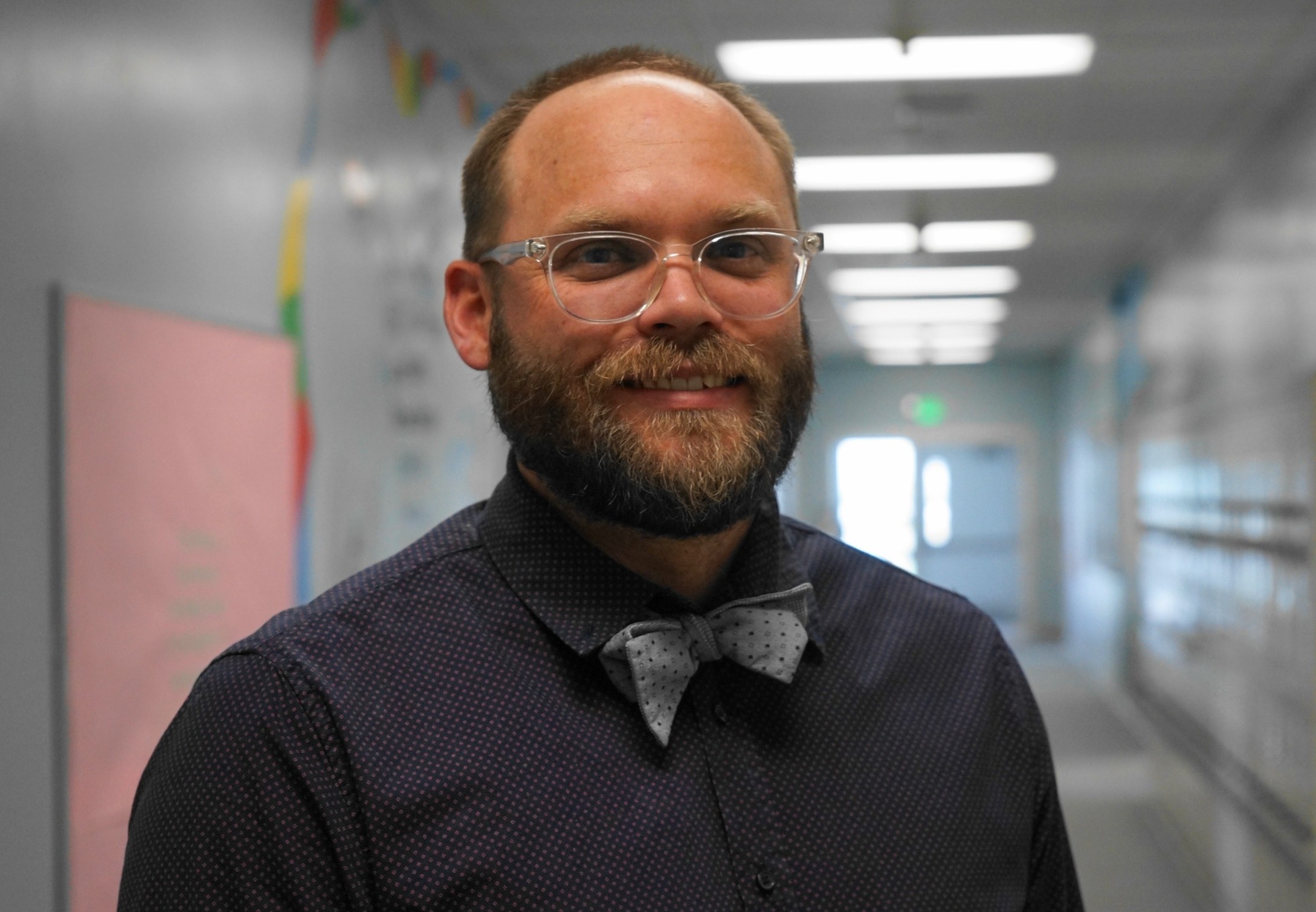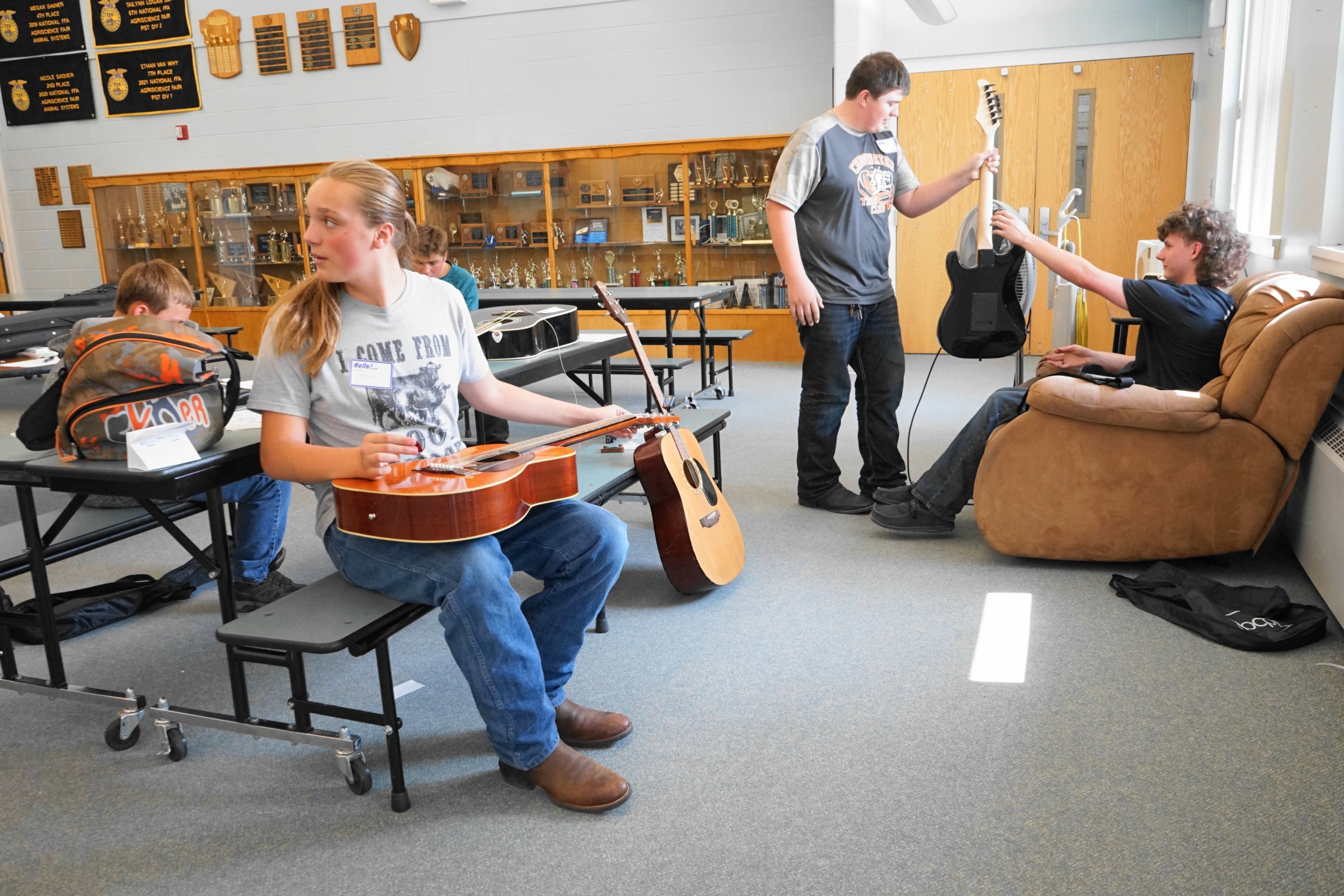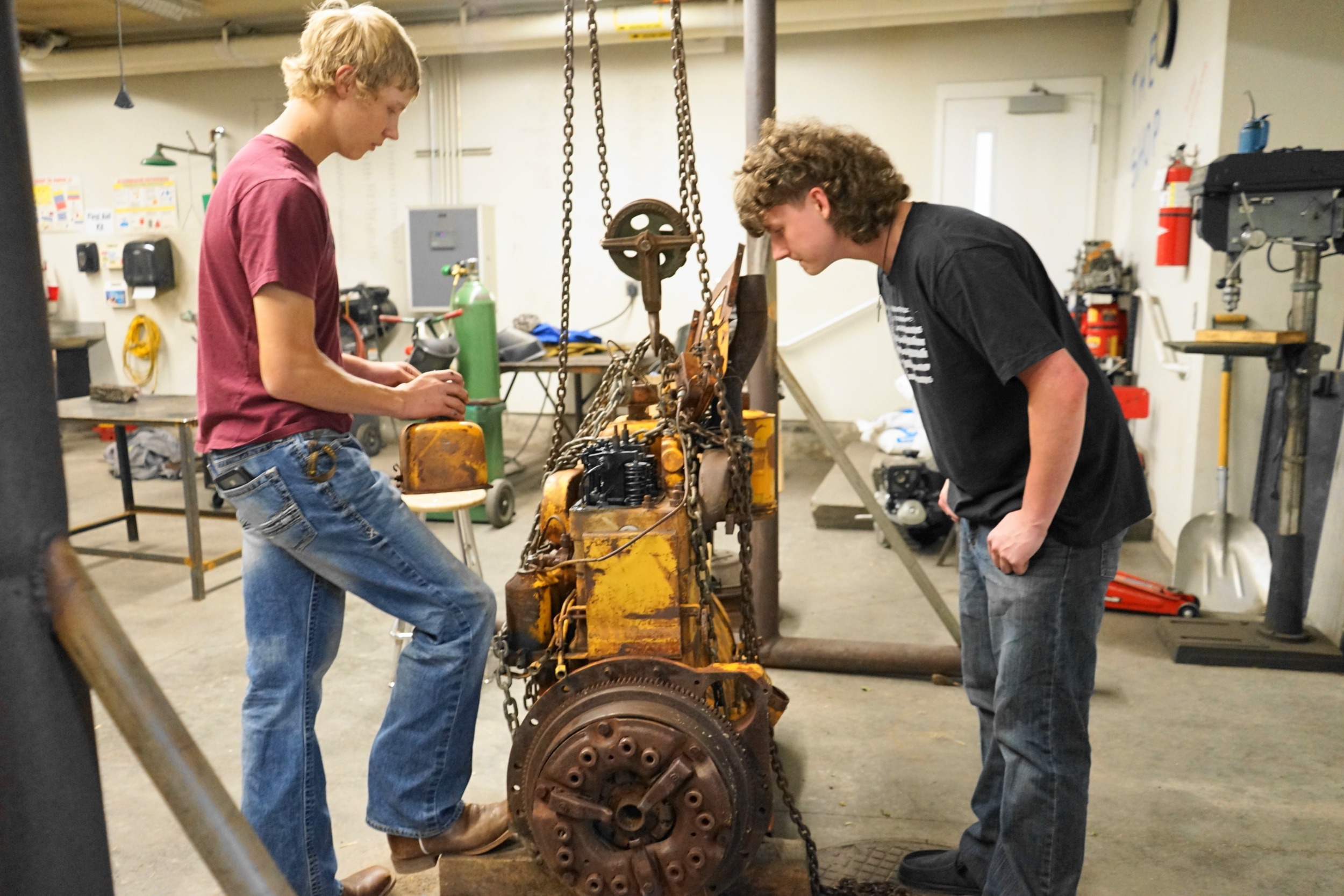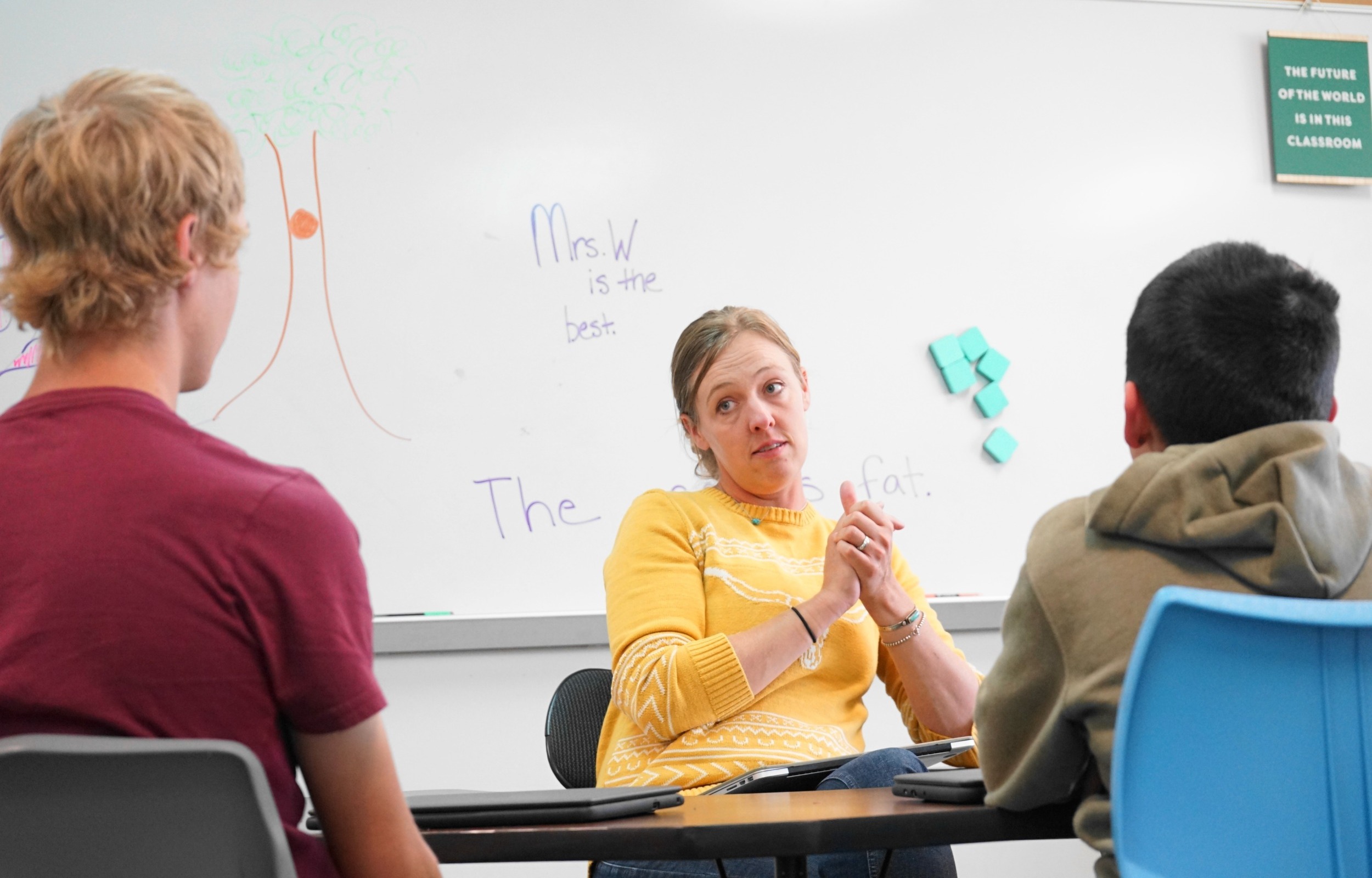CHUGWATER, Wyo.— How do you run a school without any teachers? Chugwater, Wyoming, population 175, faced that question after five of the seven teachers at the town’s only public school quit in June 2022.
The answer from the county school district that operated Chugwater School: You don’t.
Platte County School District No. 1 closed Chugwater School this spring, leaving the school’s 31 students to face an hour-long bus ride to the nearest public school, in Wheatland.
But this fall, teachers who left the county-operated school joined with local parents to open a new charter school — Prairie View Community School — in the building that once housed Chugwater School.
For most Chugwater families, the new charter school has become their new local public school.
Prairie View is one of three charter schools approved after Wyoming lawmakers transferred the authority to approve the creation of new charter schools from local districts to a newly created state board last year. Like Wyoming’s traditional public schools, charters are publicly funded and free for students to attend. Charters receive the same amount of funding as public schools but have more flexibility in their operations than traditional public schools.
Prairie View and the other new charter schools join five already operating in Wyoming.
When the first charter schools opened 30 years ago they were seen as alternatives to the local public schools and an opportunity for parents to pick from a menu of educational options. And while about 90% of charter schools are still in cities and suburbs, the number of charter schools in rural areas is slowly growing.
The number of rural charter schools in the U.S. has grown by 6% — from 785 to 836 — in the past decade, according to a National Association of Public Charter Schools analysis Chugwater shows how school choice policies play out in rural areas, where distance and economics often circumscribe a different kind of school choice. Still, only about 3% of rural students nationally attend a charter school.
More rural charter schools
Those numbers are rising in part because rural states like Idaho, West Virginia and Alabama have passed new legislation that makes it easier to set up charter schools.
As of 2018, the states where rural charter schools had the highest market share included Hawaii, Arizona, Utah, Nevada and Colorado, according to research from Auburn University professor David Marshall.
Students at rural charter schools are more likely to be low-income than those at traditional public schools in the same states, according to Marshall’s study. And, as the population in rural areas is predominantly white, so are students at rural charter schools. Rural charter schools are also more likely to use a project-based approach to teaching, compared to urban charter schools, and less likely to follow the models of charter schools like KIPP that set high academic and behavioral standards, according to Marshall’s research.
When thinking about whether the rise in rural charter schools is good for kids, Marshall said the most important question one can ask is: ‘What’s best for students?'”
“And in many cases, charters are best for students, especially in rural areas where certain challenges persist,” Marshall said. “There are many nuances that shift from one student to the next, but, because charter schools have more autonomy, they’re better equipped to address challenges and crises in real time.”
‘Our needs were not being met’
Bryce Cushman, Prairie View director and math teacher, was one of the teachers who resigned from Chugwater School in 2022. For several years, he had been frustrated by what he saw as teacher shortages, increasing workloads without pay raises, slow responses from county administrators and curricula designed by committees in cities far removed from the realities of life in rural communities.

David Dudley for Youth Today
Prairie View Community School director and math teacher Bryce Cushman. Cushman was one of the five teachers who resigned from Chugwater School in 2022.
“We asked for what we needed many times,” Cushman said. “Our needs were not being met by the district, and we were being asked to do more each week.”
The final straw for Cushman came when the district asked Chugwater School’s core subject teachers — those who taught math, reading, science and social studies — to split their time between Chugwater and Glendo School, making the two-hour roundtrip to Glendo twice a week.
“I felt that I could no longer provide the education that my students deserved, and I was exhausted by going back and forth with the district,” Cushman said. “So, I finally decided to resign.”
The county school district already struggled to find certified teachers to move to a rural area with low enrollment, said John Weigel, interim superintendent of Platte County School District No. 1.
With just two teachers left at Chugwater School, frustrated parents began withdrawing their kids. A combination of low enrollment, budget shortfalls, and fraught communications between the district and parents ultimately led to the Platte County School Board’s vote to close Chugwater School, Weigel said.
Jerah Nix, a nurse and mother of four whose kids attended Chugwater School, was already concerned about the number of teachers at the struggling school before the teacher exodus in 2022.
In May of 2022, Nix reached out to her friends Jill Winger, a popular homestead lifestyle blogger, and her husband Christian Winger, to envision the kind of school that would best serve their community.
“We wanted to see more focus on tangible skills and immersing children in their communities,” said Winger, who until this year homeschooled her three children. “Though it’s small, Chugwater has so many people and resources, and we want to weave that into what we’re offering our kids.”
Nix, the Wingers, Cushman and his wife Dana, and other members of community worked together for three months on the curriculum — a combination of subjects like math, reading, writing, history and science, as well as learning how to plant, harvest, store, and cook crops — while preparing their application to open the charter school in the fall semester of 2023.
Prairie View receives about the same amount of public funding per student as Chugwater did — about $16,698 per student — but the new school’s leaders think they can make the finances work where Chugwater failed because they will augment their core subject teachers with community volunteers who will teach electives like guitar, podcasting, and various agricultural disciplines.

David Dudley for Youth Today
Prairie View Community School students learn to play guitar. In the background, trophy cases, containing trophies from the school’s previous occupant, Chugwater School, line the wall.
Prairie View employs nine teachers, two of whom taught at Chugwater School last year, for 58 students. The new charter is governed by a five-member board of directors. One of their first decisions was to implement a four-day school week for students, something Cushman had always wanted as a teacher.
“Having Fridays off frees teachers to do more planning and collaborating,” Cushman said. “It helps us to pivot quickly if we need to. And for those students who are struggling with a subject, are behind on assignments, or if they need some kind of intervention, we can give them more focused attention on Fridays.”
‘That tractor will come in handy’
Jonathon Smith attended Chugwater School as a sophomore — where he was in Cushman’s science class — before attending Central High School in Cheyenne, an hour-long bus ride to the south, last year.
“I didn’t do great in Cheyenne,” Smith said. “Besides the extra travel time, I’m not good at problems that deal with… intangible things? Equations, stuff like that. I’m a visual and physical learner. I feel more engaged when I can touch the things I’m learning about.”
He’s back in Chugwater this year, as the sole senior of Prairie View Community School’s class of 2024. At Prairie View, Smith likes that teachers tailor assignments to students. He’s learning to play the guitar, and he’s learning to weld. Smith wants to become an electrician, so he’s trying to graduate as quickly as possible to start trade school or an apprenticeship.
“I also like that we do four-day weeks,” said Smith. “It gives us more time to do homework, rest and recharge and do fun stuff.”
Prairie View junior Ethan Van Why, whose mom and grandmother graduated from Chugwater School, is refurbishing a tractor — an Minneapolis-Moline 5-star diesel — as part of his daily course work.
“My grandfather sold those tractors in Colorado in the 1950s,” said Ethan. “He gave this one to my dad, then my dad gave it to me. Once I’m finished, I can use it to hay and run a baler. I can also use it for fun at tractor pulls.”

David Dudley for Youth Today
Ethan Van Why (left) shows his tractor engine to Jonathon Smith. Van Why, a junior, is refurbishing the engine as part of an elective class.
“I don’t know what I’ll do after school,” Ethan added. “But that tractor will come in handy. And, knowing how to work on engines is an important skill to know, no matter what field I go into.”
‘Growing pains’
Prairie View is experiencing what Cushman called “growing pains.”
Prairie View doesn’t offer transportation, so students have to rely upon their parents and older siblings for rides to and from school; Wyoming doesn’t require schools to provide transportation and, so far, purchasing a bus has been out of reach for the new school due to cost and supply chain challenges, Cushman said.
And as of early September, Prairie View didn’t provide school meals largely because the school’s kitchen doesn’t meet state Health Department standards; when Chugwater School occupied the building, the county district delivered meals prepared at another district school.
So, all students bring their own lunches. Teachers and staff donate hot dogs, corndogs, chips and locally donated produce to students who aren’t able to bring their own food.
Cushman and his team didn’t hire a janitor, because they weren’t sure if they could support one’s salary for the school year. So the last thing students do before they leave school each day is get into four groups, each responsible for cleaning the school’s floors, bathrooms and surfaces and collecting trash throughout the building.
Mike Van Why, a heavy machinery mechanic and Ethan’s dad, said that he likes the idea of his kids working together to provide a service for their school community.
“To my way of thinking,” said Van Why, “that’s going to teach students to learn the pride of ownership. They’ll learn that, if they make a mess, nobody’s going to clean it up for them. They hold each other accountable.”
The Van Whys sent their kids to Chugwater School last year, but over the past 10 years watched the school go from “great to worse,” Mike Van Why said.
When Prairie View was given a lease for the building in which it now operates, Van Why enrolled his two sons.
Trophy cabinets line the east wall of Prairie View’s common room, which also serves as the school’s cafeteria.
The cases hold more than 100 trophies dating back to the 1950s awarded to Chugwater School for outstanding achievement in agriculture and volleyball, to name a few. A photograph shows the Chugwater School 1964 state champion basketball team, a reminder of the school’s past glory.
“It’s sad to think about,” Mike Van Why said. “There’s such a deep, rich history of the community in that school building. We’re all sad to see it go, but we feel good about where it’s going.”
***
David Dudley is a Cheyenne, Wyoming-based journalist who covers education, government and economics.
***
This story was corrected and updated on Oct. 27, 2023 and Oct. 31, 2023: An earlier version of this article misstated the type of tractor Prairie View student Ethan Van Why is restoring. It is a Minneapolis-Moline, not an Indianapolis-Moline. Additionally, parent Mike Van Why’s statement that “At the end of each school year, we’d receive a notice from the district office threatening to close the school” was removed for clarity. While Van Why did receive communications from the district regarding potential school closure, those communications were not formal legal notices. An earlier version of this article misstated some activities for which Chugwater School won trophies. Those activities do not include soccer.




























